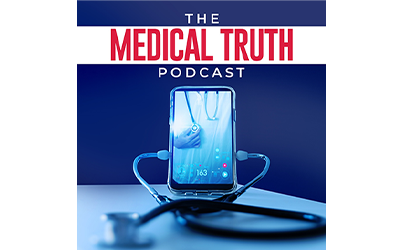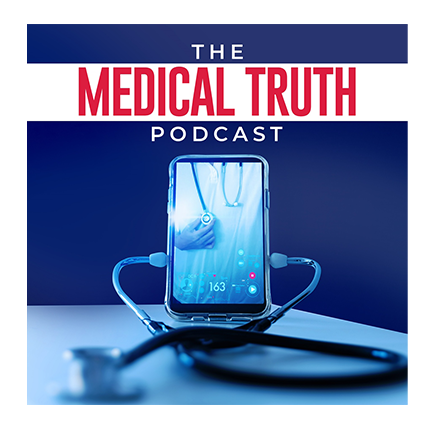In this episode of the Medical Truth Podcast, James Egidio interviews Laura Bartlett, the founder of Hospital Hostage Help. Bartlett is a healthcare advocate and activist who is passionate about empowering patients to assert their rights in the healthcare system. Her organization, Hospital Hostage Help, was founded in 2020 in response to the COVID-19 pandemic, which saw patients and their families struggling to understand and navigate the healthcare system.
Hospital Hostage Help’s primary goal is to educate patients about their rights, particularly their right to informed consent. Informed consent means that patients have the right to know the risks, benefits, and alternatives to any treatment that is being proposed by their doctor. Patients also have the rights to refuse treatment, and hospitals cannot force them undergo any procedure to take any medication that they do not want. Bartlett’s organization helps patients understand their rights, connect with legal resources if necessary , and provide emotional support when needed.
One of the key issues Bartlett and her organization have been focusing on is the importance of patient advocacy. Patient advocates play a crucial role in the healthcare system, helping patients navigate complex medical procedures, communicate with doctors and nurses, and make informed decisions about their treatment. Patient advocates can be family members, friends, or professionals who specialize in patient advocacy.
Bartlett believes that patients need to be more proactive in asserting their rights and advocating for themselves in the healthcare system. Patients should educate themselves about their rights, ask questions, and be assertive in communicating with their healthcare providers. Patients should also keep copies of their medical records and documentation of any conversations they have with their doctors or nurses.
Bartlett’s organization also emphasizes the importance of having a legal document that outlines patients’ current consent to medical procedures and medications. The “Caregivers and Consent Document” is a legal document that reflects patients’ current wishes and deeply held religious and spiritual beliefs. Patients are encouraged to fill out this document, especially if they do not want to receive specific vaccines or medications. The document must be accessible in the electronic medical records at all times for all care providers to see, and any violation of its terms will result in a complaint being filed with the state medical board.
Bartlett also shares her knowledge on how patients can assert their rights to refuse a COVID-19 vaccine or any medical procedure. She recommends that patients download, fill out, and get a notarized copy of a document that asserts their right to refuse medical procedures, including vaccines. She suggests that patients keep a copy of the document with them at all times and present it to any medical professional who tries to coerce them into receiving the vaccine. She explains that medical professionals must respect a patient’s right to refuse a medical procedure, just as they respect a patient’s religious or spiritual beliefs.
One of the driving forces Bartlett’s advocacy work is a personal experience. The organization is named after a man whose father was admitted to the hospital for a urinary tract infection, was tested positive for COVID-19, and then started on a protocol that did not include budesonide, a steroid used to trat early COVID-19 symptoms. When the family tried to assert their right to use budesonide, the hospital did not respect their wishes, and the patient’s condition worsened. The family was eventually told that their father was a “hospital hostage” and could not leave. Against medical advice, the family took their father out of the hospital, and he made a full recovery after starting budesonide at home.
This experience highlights the need for patients and their families to be aware of their rights and the importance of advocating for themselves. Patients an their families should not be afraid to ask questions an speak up if they feel their rights are being violated.
Overall, Laura Bartlett’s work as a healthcare advocate and founder of Hospital Hostage Help highlights the importance of patient rights and informed consent in the healthcare system. Her organization provides a valuable resource for patients and their families who may feel overwhelmed or unsure about their rights while in the hospital. By empowering patients to educate themselves and be assertive in communicating with their healthcare providers, Bartlett is helping to create a more patient-centered healthcare system.
Furthermore, Bartlett’s emphasis on the importance of legal documents, such as Caregivers and Consent Document, and the need for patients to have copies of their medical records, reflects the growing importance of patient autonomy and the need for patients to have greater control over their healthcare decisions. In a healthcare system where medical errors and miscommunications can have serious consequences, Bartlett’s work serves as a reminder of the need for patients to be proactive and informed about their rights and options.
In conclusion, Laura Bartlett’s work as a healthcare advocate and founder of Hospital Hostage Help provides a valuable resource for patients and their families who may feel overwhelmed or unsure about their rights in the healthcare system. By empowering patients to educate themselves and be assertive in communicating with their healthcare providers, Bartlett is helping to create a more patient-centered healthcare system. Her emphasis on the importance of legal documents and patient autonomy underscores the need for patients to have greater control over their healthcare decisions and to be informed and proactive when it comes to their healthcare.







